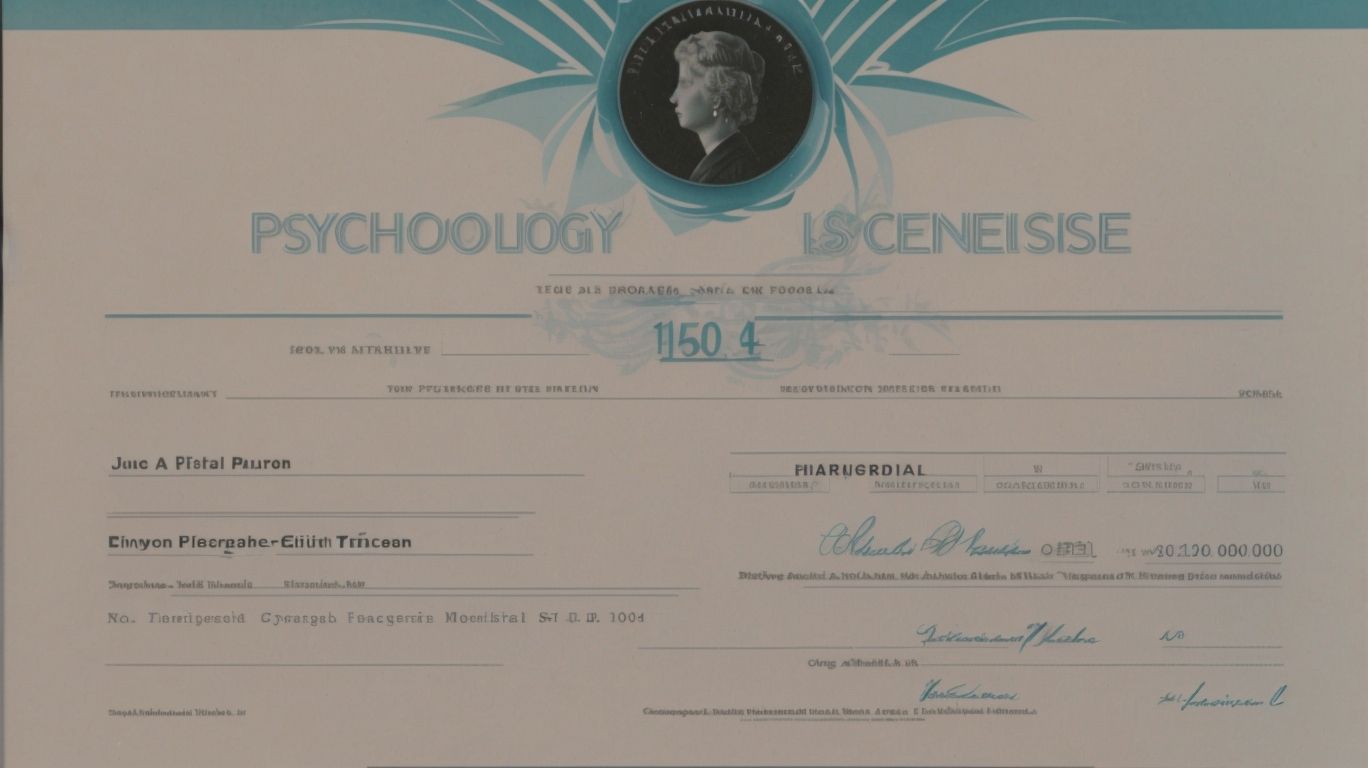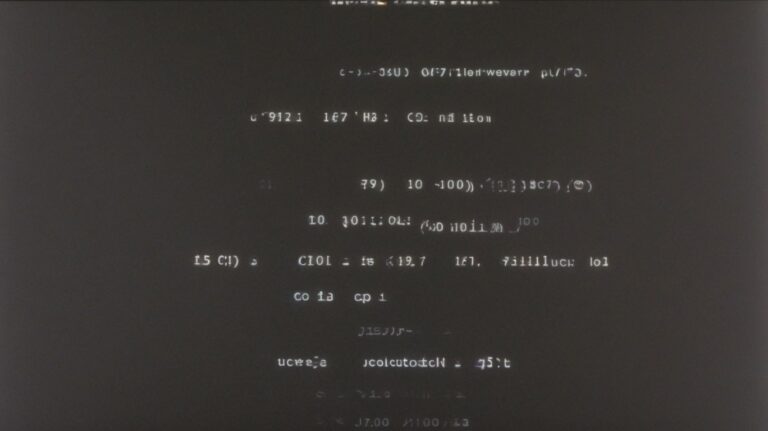Are you interested in pursuing a career in psychology but unsure about the licensing requirements? In this article, we will explore what a psychology license is, the importance of an APA accredited degree for psychology licensing, and the requirements for obtaining a psychology license.
We will also discuss whether it is possible to obtain a psychology license with a non-APA accredited degree, the benefits of obtaining a psychology license, and the steps to obtain a psychology license with a non-APA accredited degree. Whether you are a current psychology student or a professional considering a career change, this article will provide valuable insights into the world of psychology licensing.
Contents
- 1 Key Takeaways:
- 2 What Is a Psychology License?
- 3 Why Is an APA Accredited Degree Important for Psychology Licensing?
- 4 What Are the Requirements for Obtaining a Psychology License?
- 5 Can You Obtain a Psychology License with a Non-APA Accredited Degree?
- 6 What Are the Benefits of Obtaining a Psychology License?
- 7 What Are the Steps to Obtain a Psychology License with a Non-APA Accredited Degree?
- 8 Frequently Asked Questions
- 8.1 What is a non-APA accredited degree in psychology?
- 8.2 Can I still become a licensed psychologist with a non-APA accredited degree?
- 8.3 What are the requirements for obtaining a psychology license with a non-APA accredited degree?
- 8.4 Are there any limitations to practicing with a non-APA accredited degree?
- 8.5 Can I transfer my credits from a non-APA accredited degree to an APA accredited program?
- 8.6 What can I do if I am unable to meet the requirements for a psychology license with a non-APA accredited degree?
Key Takeaways:
What Is a Psychology License?
A psychology license is a certification granted by the state regulatory board that authorizes an individual to practice as a professional psychologist.
Obtaining a psychology license is a crucial step for psychologists as it ensures that they meet the rigorous standards set by the regulatory board. This certification signifies that the individual possesses the necessary education, training, and experience to provide ethical and competent psychological services.
Psychologists with a license have legal authorization to diagnose and treat mental health disorders, conduct psychological assessments, and offer therapy to individuals, couples, and families. This not only safeguards the well-being of their clients but also maintains the highest professional standards.
Why Is an APA Accredited Degree Important for Psychology Licensing?
An APA accredited degree holds paramount importance for psychology licensing as it signifies adherence to rigorous educational standards and ethical practices set by the American Psychological Association (APA).
This accreditation indicates that the program has met the strict criteria established by the APA, ensuring that students receive a comprehensive education that prepares them for successful careers in psychology.
APA accreditation is vital as it ensures that graduates have the necessary knowledge, skills, and competencies to provide high-quality psychological services. A degree from an APA accredited program can greatly enhance professional development opportunities, as it is widely recognized and respected within the field. Many state licensing boards require applicants to have completed an APA accredited program to qualify for licensure, further emphasizing the significance of APA accreditation in psychology education.
What Are the Requirements for Obtaining a Psychology License?
Obtaining a psychology license entails fulfilling specific educational, experience, and examination requirements, including supervised clinical practice and successful completion of licensing examinations such as the EPPP.
Individuals pursuing a psychology license typically need to complete a doctoral degree in psychology from an accredited institution. This academic requirement ensures that candidates have a deep understanding of psychological theory, research methods, and ethical practices.
Beyond formal education, aspiring psychologists usually need to complete a specified number of supervised clinical hours under the guidance of licensed professionals. These practical experiences aim to nurture essential counseling, assessment, and intervention skills, enriching the candidate’s practical knowledge and expertise.
Educational Requirements
The educational requirements for a psychology license vary by state and typically involve completion of a doctoral program in psychology from an accredited institution, such as one approved by the APA or the CoA.
Doctoral programs in psychology are structured to provide comprehensive training in clinical practice, research, and theoretical foundations. Prospective psychologists often pursue a Doctor of Psychology (Psy.D.) or a Doctor of Philosophy (Ph.D.) in Psychology.
These programs delve deep into areas like psychopathology, assessment, and intervention techniques. They emphasize practical experience through supervised internships and research opportunities to ensure a well-rounded education that prepares students for the challenges of the profession.
Accreditation is another crucial aspect. The American Psychological Association (APA) and the Commission on Accreditation (CoA) set rigorous standards for doctoral programs to maintain quality and consistency. As such, completion of a program accredited by these bodies demonstrates that graduates have acquired the necessary knowledge and skills to meet professional standards.
It’s essential to be aware of state-specific variations. Some states may have additional requirements, such as specific coursework, supervised clinical hours, or postdoctoral training. Prospective psychologists should carefully research and consider the specific licensing requirements in the state where they intend to practice to ensure compliance with all necessary regulations.
Experience Requirements
Experience requirements for psychology licensing typically involve completing a supervised postdoctoral internship or fellowship, accumulating a specified number of supervised clinical hours, and demonstrating competence in diverse psychological domains.
Aspiring psychologists often need to engage in a variety of postdoctoral experiences, such as assessments, treatment planning, and therapy sessions under the supervision of licensed professionals to gain the necessary expertise.
In addition, they must also exhibit proficiency in ethical standards, multicultural awareness, and evidence-based practice, which are crucial components of their clinical competencies.
Examination Requirements
Examination requirements for psychology licensing often entail successful completion of the Examination for Professional Practice in Psychology (EPPP) administered by the ASPPB, along with state-specific jurisprudence and ethics examinations.
When preparing for the EPPP, candidates need to cover a wide range of topics, including biological bases of behavior, assessment and diagnosis, treatment, and professional ethics and standards.
Many jurisdictions require candidates to pass a state-specific exam that assesses their understanding of local laws and regulations governing the practice of psychology. This might include questions on professional conduct, confidentiality, and mandatory reporting.
Regulatory assessments are often part of the licensure process, ensuring that candidates are familiar with the laws and regulations pertinent to the field of psychology in their respective jurisdictions.
These assessments are critical as they verify a candidate’s competence and knowledge of the legal and ethical responsibilities associated with practicing psychology.
Can You Obtain a Psychology License with a Non-APA Accredited Degree?
While APA accreditation is highly valued, certain states may have provisions for obtaining a psychology license with a non-APA accredited degree, subject to meeting specific state requirements and alternative pathways to licensure.
In such cases, individuals holding a non-APA accredited degree may need to demonstrate their competency and qualifications through additional evaluations or exams as mandated by the state regulatory boards.
It’s essential to consider the potential limitations of practicing with a non-APA accredited degree, such as restrictions on certain specialized areas of psychology or limitations on insurance reimbursements for services rendered. Therefore, aspiring psychologists should thoroughly research the state-specific regulations and consult with licensing authorities to understand the implications of a non-APA education on their professional practice.
State Requirements for Non-APA Accredited Degrees
State requirements for psychology licensing with non-APA accredited degrees may involve additional educational benchmarks, supervised practice, or examination performance to compensate for the absence of APA accreditation.
Each state sets its own guidelines for psychology licensing. This often includes additional coursework for candidates with non-APA accredited degrees, such as classes in ethics or cultural awareness. Supervised practice hours are also commonly required to ensure practical skills meet industry standards.
In addition, some states may have a state-specific examination that candidates must pass to demonstrate proficiency in the state’s laws and regulations governing psychology practice.
Alternative Routes to Licensure
Alternative routes to psychology licensure offer flexibility for individuals with non-traditional educational backgrounds, including opportunities for mobility between jurisdictions, endorsement through the National Register, or specialization through organizations like ABPP.
For those seeking mobility, the Association of State and Provincial Psychology Boards (ASPPB) provides a pathway through the Interjurisdictional Practice Certificate (IPC), allowing psychologists to practice across state lines without going through the traditional licensure application process in each jurisdiction.
Professional endorsement is attainable through the National Register of Health Service Psychologists, offering a streamlined process for psychologists with doctoral degrees from programs not accredited by the American Psychological Association (APA).
Specialization can also be pursued through the American Board of Professional Psychology (ABPP), recognizing expertise in various areas of psychology through board certification.
What Are the Benefits of Obtaining a Psychology License?
Obtaining a psychology license offers numerous advantages, including expanded job opportunities, the ability to work independently, and higher salary potential, enhancing professional and personal fulfillment.
With a psychology license, psychologists have the flexibility to pursue various career paths such as clinical psychology, counseling, industrial-organizational psychology, or research.
These diverse job opportunities allow professionals to make a meaningful impact in different settings, from hospitals and private practices to educational institutions and corporate organizations.
Licensed psychologists have the autonomy to establish their own practices, develop specialized therapy programs, conduct research studies, or provide expert testimony in legal proceedings.
This level of independence fosters a sense of professional fulfillment and give the power toment.
In addition, a psychology license often translates into higher earning potential.
Licensed psychologists can command more competitive salaries in both clinical and academic settings, providing financial security and stability.
This elevated income level also allows for greater personal and professional rewards, paving the way for a purposeful and fulfilling career in psychology.
Increase in Job Opportunities
Possessing a psychology license augments job opportunities, enabling individuals to pursue diverse professional roles in clinical practice, research, academia, and specialized fields within psychology.
Individuals with a psychology license can embark on a rewarding career in clinical psychology, working directly with clients to address mental health concerns, or in counseling psychology, guiding individuals through personal and emotional challenges.
Research opportunities abound, allowing licensed psychologists to delve into various aspects of human behavior, cognition, and emotions to contribute to the advancement of psychological knowledge. In academia, licensed psychologists can opt for teaching and mentorship roles, shaping the next generation of mental health professionals.
Specialized fields such as forensic psychology, organizational psychology, and sports psychology offer exciting avenues for licensed professionals to apply their expertise in unique settings.
Ability to Work Independently
A psychology license grants the autonomy to establish independent clinical practice, develop private counseling services, and contribute to mental health initiatives, fostering professional self-determination and impact.
This independence allows licensed psychologists to tailor their therapeutic approaches to best meet the unique needs of their clients, creating a more personalized and effective treatment experience.
Professional autonomy enables psychologists to pursue specialized areas of interest, conduct research, and implement innovative interventions that advance the field of psychology. The licensure also provides credibility and trust among clients, as it signifies a commitment to ethical standards and ongoing professional development.
Higher Salary Potential
Psychology licensure correlates with higher salary potential, offering financial rewards commensurate with increased expertise, specialization, and contributions to the field of psychology.
Professionals who attain licensure in psychology often experience a notable increase in their earning potential. This is especially evident as they demonstrate advanced skills and knowledge within specialized areas such as clinical, counseling, or industrial-organizational psychology.
By obtaining licensure, psychologists can access a wider range of career opportunities, including private practice, government roles, and academic positions. These roles are associated with higher remuneration compared to non-licensed roles in the field.
What Are the Steps to Obtain a Psychology License with a Non-APA Accredited Degree?
The process of obtaining a psychology license with a non-APA accredited degree involves thorough research of state requirements, additional education or training to meet criteria, gaining relevant experience, passing required examinations, and submitting the application with necessary documents.
When preparing for licensure in psychology, it’s crucial to research and understand the specific requirements set by the state licensing board. This may involve enrolling in additional coursework that meets the state’s guidelines. It’s also important to gain practical experience through internships or supervised practice. Additionally, rigorous preparation for the licensing exams is necessary to demonstrate competence and knowledge in the field. Finally, submitting a thorough application with all required documentation completes the process.
Research State Requirements
Initiating the process involves comprehensive research of state-specific requirements for psychology licensure with a non-APA accredited degree, understanding the additional benchmarks and alternative pathways available within the jurisdiction.
Each state holds unique regulations regarding the licensure of psychologists with non-APA accredited degrees. It is essential to delve into the specific guidelines set forth by the state licensing board.
This often entails meticulous scrutiny of the application process, requisite qualifications, and any supplemental examinations or experiences that may be mandated. Aspiring psychologists must be cognizant of any reciprocity agreements that the state may have with other jurisdictions, which could provide an alternative avenue to licensure.
Complete Additional Education or Training
Individuals pursuing psychology licensure with non-APA accredited degrees may need to fulfill additional educational or training requirements to meet state benchmarks, addressing areas of deficiency or specialization as needed.
When seeking licensure with a non-APA accredited degree, individuals should be prepared to engage in remediation and skill development to compensate for any potential gaps in their education.
Additional coursework in specific areas of emphasis, such as clinical assessment, ethical practice, and multicultural competence, may be necessary to ensure a well-rounded professional preparation.
Seeking guidance from experienced professionals and participating in relevant workshops or training programs can significantly contribute to the acquisition of the necessary skills and competencies.
It is essential for individuals in this situation to proactively identify their areas of educational need and take targeted steps towards fulfilling those requirements to meet the state benchmarks.
Gain Relevant Experience
Accumulating relevant experience through supervised internships, clinical placements, or specialized fellowships is integral to meeting state requirements for psychology licensure with a non-APA accredited degree.
These hands-on opportunities allow aspiring psychologists to apply theoretical knowledge in real-life scenarios, enhancing their proficiency and competence.
The exposure gained from working under the guidance of experienced professionals equips them with invaluable insights and practical skills essential for ethical and effective practice.
Completing supervised training instills confidence and credibility, demonstrating the candidate’s readiness to uphold the standards expected in the field of psychology.
Pass Required Examinations
Successful completion of licensing examinations such as the EPPP, as well as any additional state-specific tests, is essential for individuals seeking psychology licensure with a non-APA accredited degree.
These examinations serve as a standardized measure of competence, ensuring that individuals possess the necessary knowledge and skills to practice psychology professionally.
Meeting the licensure criteria through successful examination performance demonstrates to regulatory bodies and potential employers the capability to provide high-quality and ethical psychological services. It also validates the proficiency of individuals graduating from non-APA accredited programs, underlining their eligibility for licensure. Therefore, adequate preparation and dedication to achieving success in these examinations are paramount for psychologists with non-traditional educational paths.
Submit Application and Required Documents
Completing the process involves submitting the licensure application along with necessary documents, transcripts, and verifications as mandated by the state regulatory board for psychology licensure with a non-APA accredited degree.
The submission of the application typically requires detailed personal information, educational history, and professional experience.
Alongside the application, candidates must compile and provide various documents such as transcripts from the educational institution, verification of supervised practice hours, and any other required credentials. These documents are crucial for the board to assess the candidate’s eligibility for licensure.
The state regulatory board may conduct verifications to ensure the accuracy and legitimacy of the submitted information and documents.
Frequently Asked Questions
What is a non-APA accredited degree in psychology?
A non-APA accredited degree in psychology is a degree from a college or university that has not been recognized or approved by the American Psychological Association (APA). This means that the program may not meet the standards and requirements set by the APA for psychology education and training.
Can I still become a licensed psychologist with a non-APA accredited degree?
Yes, it is still possible to obtain a psychology license with a non-APA accredited degree. However, the process may be more challenging and may require additional steps and requirements to be met.
What are the requirements for obtaining a psychology license with a non-APA accredited degree?
The specific requirements may vary depending on the state you wish to practice in. Generally, you will need to have completed a certain number of education and training hours, pass a licensure exam, and meet any additional criteria set by the state board of psychology.
Are there any limitations to practicing with a non-APA accredited degree?
Some states may have limitations or restrictions on the type of work or population you can serve with a non-APA accredited degree. It is important to research the specific state’s requirements and regulations before pursuing a psychology license.
Can I transfer my credits from a non-APA accredited degree to an APA accredited program?
It is possible to transfer credits, but it will depend on the specific program and their transfer policies. It is important to note that not all credits may be accepted, and you may be required to take additional courses in an APA accredited program to meet their standards.
What can I do if I am unable to meet the requirements for a psychology license with a non-APA accredited degree?
If you are unable to meet the requirements for a psychology license with a non-APA accredited degree, you may consider enrolling in an APA accredited program to obtain the necessary education and training. You may also explore alternative careers in the field of psychology that do not require a license.





